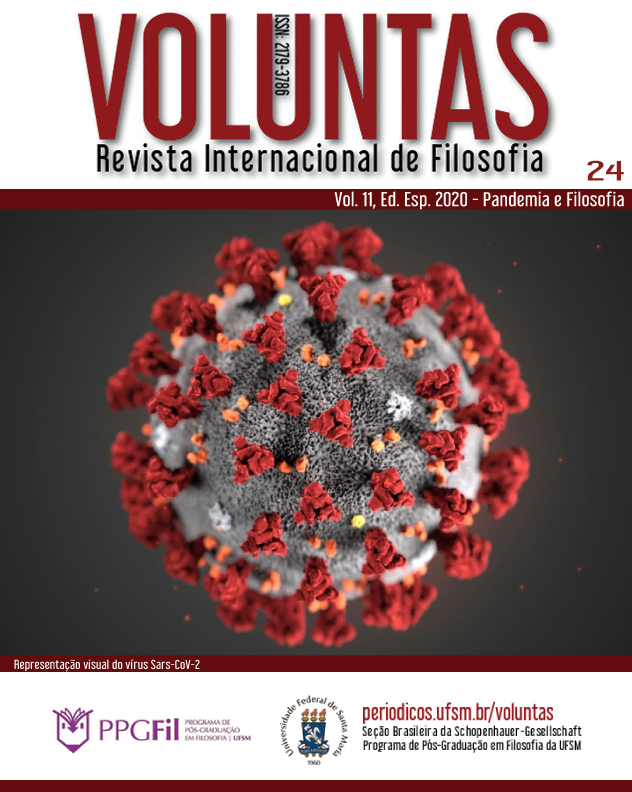Social isolation in the context of the COVID-19 pandemic: a dialogue between biopolitics and critical criminology
DOI:
https://doi.org/10.5902/2179378643918Keywords:
Public Policies, Social Isolation, Social Control, Biopolitics Critical Criminology COVID-19Abstract
This paper proposes a critical thought on social isolation policies, resulting from the emergency of international concern caused by the pandemic of COVID-19, as capable of implying a more intense social control to a specific social group. Based on the assumption that criminalization processes do not necessarily reach the most aggressive behaviors, because it is determined by a political (in the liberal and conservative sectors) and economical correlation, and using the dialogical methodology, which seeks to develop shared knowledge through interdisciplinary sources, the purpose of this research is to analyze the measure of social isolation based on discussions between biopolitics and critical criminology, to understand on to whom the protection of social isolation is addressed and a possible criminalization of violation.Downloads
References
AGAMBEN, Giorgio. Homo Sacer: o poder soberano e avida nua. Tradução Henrique Burigo. Belo Horizonte: Editora UFMG, 2002.
BATISTA, Nilo. Introdução crítica ao Direito Penal brasileiro. 11.ed. Rio de Janeiro: Revan, 2007. p.17-39.
BATISTA, Vera Malaguti. Introdução crítica à criminologia brasileira. Rio de Janeiro: Revan, 2011. p. 21-40.
BARATTA, Alessandro. Criminología Crítica y Crítica del Derecho Penal – Introducción a la sociología jurídico-penal. Siglo Ventiuno Editores. Buenos Aires, 2011.
BRASIL. Ministério da Saúde, Portaria nº 188 de 3 de fevereiro de 2020. Disponível em: < http://www.in.gov.br/web/dou/-/portaria-n-188-de-3-de-fevereiro-de-2020-241408388>. Acesso em 26/04/2020.
BRASIL. Lei Federal nº 13.979/2020 de 6 de fevereiro de 2020. Disponível em: http://www.planalto.gov.br/ccivil_03/_ato2019-2022/2020/lei/L13979.htm Acesso em 26/04/2020.
CARVALHO, Salo de. Criminologia crítica: dimensões, significados e perspectivas atuais. In: KASHIURA JR, Celso Naoto; AKAMINE JR, Oswaldo e MELO, Tarso de. Para a crítica do direito – reflexões sobre teorias e práticas jurídicas. São Paulo: Outras expressões: Editorial Dobra, 2016.
DE GIORGI, Alessandro. A miséria governada através do sistema penal. Instituto Carioca de Criminologia. Coleção Pensamento Criminológico. Editora Revan. Rio de Janeiro, 2006.
FOUCAULT, Michel. Vigiar e punir. Petrópolis: Editora Vozes, 1991.
FOUCAULT, Michel. Microfísica do poder. Rio de Janeiro: Editora Graal, 1996
FOUCAULT, Michel. Em defesa da sociedade: curso no Collège de France (1975-1976); Tradução Maria Ermantina Galvão. – São Paulo: Martins Fontes, 2005.
FOUCAULT, Michel. A história da sexualidade – volume 1: a vontade de saber. Rio de Janeiro: Edições Graal, 2010.
GOULART, Adriana da Costa. Revisitando a espanhola: a gripe pandêmica de 1918 no Rio de Janeiro. Hist. cienc. saúde-Manguinhos, Rio de Janeiro , v. 12, n. 1, p. 101-142, abr. 2005 . Acesso em 26/04/2020. https://doi.org/10.1590/S0104-59702005000100006
HARVEY, David. Política anticapitalista em tempos de COVID 19. In: DAVIS, Mike. Coronavirus e a luta de classes. Terra sem amos, Brasil, 2020.
IFANGER, Fernanda Carolina Araújo; POGGETTO, João Paulo Ghiraldelli Dal. As finalidades ocultas do sistema penal. Revista Brasileira de Ciências Criminais. São Paulo, v. 24, n. 124, p. 259-297, 2016
KOLATA, Gina. Gripe: a história da pandemia de 1918. Rio de Janeiro: Record, 2002.
MASCARO, Alysson Leandro. Crise e pandemia (Pandemia Capital). São Paulo: Boitempo, 2020.
NOGUERA, Renato; SEIXAS, Rogério Luis da Rocha; ALVES, Brunior Francisco. A necropolítica na eminência do devir-negro do mundo. Voluntas: Revista Internacional de Filosofia, [S.l.], p. 150-167, set. 2019. ISSN 2179-3786. Acesso em: 22 abr. 2020. doi: http://dx.doi.org/10.5902/2179378640049
ZIBECHI, Raúl. Coronavirus: a militarização das crises. In: DAVIS, Mike. Coronavirus e a luta de classes. Terra sem amos, Brasil, 2020
Downloads
Published
How to Cite
Issue
Section
License
The submission of original manuscripts to this journal implies the transference, by the authors, of the copyrights for printed and digital publication. The copyrights of a published manuscript belong ultimately to the author, and only the copyright for its first publication is reserved to the journal. Authors may only use the same results in other publications explicitly indicating this journal as the medium of the original publication.
Licence
Attribution-NonCommercial-ShareAlike 4.0 International (CC BY-NC-SA 4.0) - This license lets others remix, tweak, and build upon your work non-commercially, as long as they credit you and license their new creations under the identical terms.






